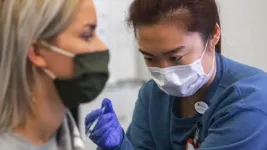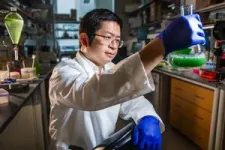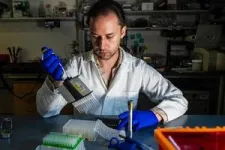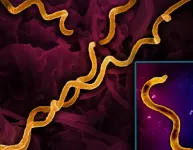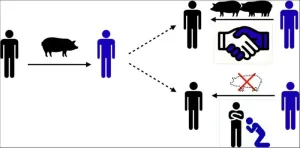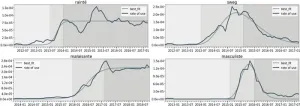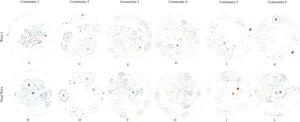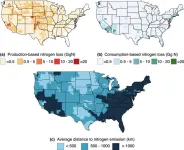(Press-News.org) We all have lived through a pandemic, its uncertainties, challenges, losses and scientific breakthroughs. A prestigious award from the U.S. National Science Foundation (NSF) is advancing the work of a team of researchers at the University of Kentucky to help society be better prepared for potential future pandemics.
Scott Berry, Ph.D., an associate professor in the Department of Mechanical and Aerospace Engineering in the UK Stanley and Karen Pigman College of Engineering, is the principal investigator of the six-year cooperative agreement projected to be nearly $18 million.
It’s part of NSF’s Predictive Intelligence for Pandemic Prevention (PIPP) program, which was initiated during the COVID-19 pandemic to address both the immediate threat as well as the broad range of diseases that drastically impact life on Earth.
In this second phase of the program, the awards establish centers comprised of multidisciplinary research teams to tackle this challenge.
UK is one of four institutions supported with this award. Its new center, named the NSF Pandemic Environmental Surveillance Center for Assessing Pathogen Emergence (NSF ESCAPE), will focus on environmental surveillance by combining social science, engineering, bioinformatics and risk modeling.
“The prevention of a pandemic is a complex process that requires a multidisciplinary set of skills,” said Berry. “People often think about doctors and nurses, but it’s really so much more than that. It’s public health officials, utility operators, basic scientists, engineers, policymakers — an entire community of problem solvers.”
NSF ESCAPE expands this team’s previous work using wastewater testing to show the first signs of a disease outbreak in a community. Berry invented a new technology called exclusion-based sample preparation to create a fast and simple way to test samples.
With the help of engineering students, Berry and his team also created a mobile lab to take wastewater testing to rural Kentucky.
“Appalachia is one of the most underserved regions of the United States, and we really wanted to bring cutting-edge technology out there,” said Berry. “That mission is reflected in our partnerships on this project. While we develop these technologies with low resource communities in mind, it’s really applicable to all our communities — rural and urban.”
Berry is leading the seven-year effort along with co-principal investigators Matthew Scotch, Ph.D., associate dean and professor in the College of Health Solutions at Arizona State University; James Keck, Ph.D., a research physician at the University of Alaska Anchorage and the Alaska Native Tribal Health Consortium; and Sarah Olson, Ph.D., the associate director of epidemiology for the Wildlife Conservation Society Health Program.
“Our team is made up of many different groups across a huge geographical distance, as well as a diversity of different skills,” said Berry. “We’re hoping to continue to develop these tools that allow us to push environmental surveillance into the farthest reaches of the world.
“That includes expansion of our surveillance to animals. Pathogens are known to jump between animals and humans, and so we can’t just limit our analysis to humans alone. We have to really look at everything.”
Berry and the NSF ESCAPE team will also work with Sahar Alameh, Ph.D., an assistant professor in the College of Education, to develop curricula for students to tackle misinformation about diseases, pandemics and viruses. Alameh’s research focuses on helping students better understand scientific phenomena and supporting teachers in that work.
Researchers will also offer training for people working in public health to better understand what this new type of data means and how they can use it to help the health of their communities.
“Research on emerging infectious diseases is a critical investment in our future, and it necessitates a collaborative approach that spans multiple disciplines and sectors and incorporates the newest tools and technology,” said NSF Director Sethuraman Panchanathan. “By bringing together experts in biology, computer science and artificial intelligence, engineering and more, these investments are well positioned to predict, prevent and respond to potential pandemics across all forms of life, thus safeguarding the health, economic stability and security of our nation.”
This project is part of a series of NSF-funded work totaling $72 million. The network of team-based centers will accelerate fundamental research and development activities to develop methods and tools that will help predict and mitigate future pandemics, whether they arise in animals, plants or humans.
Learn more about the NSF’s PIPP program online.
The White House Office of Science & Technology Policy recently invited Berry and his team to a roundtable focused on emerging technologies for preventing health emergencies. Wastewater surveillance for outbreak early warning was one of the four types of broad technology spotlighted in the discussions.
Learn more about Berry’s work early on in the pandemic to help the UK campus monitor the prevalence of COVID. The team would expand that project to better serve communities with a mobile testing lab to take to nursing homes and low-resource areas of Kentucky.
This material is based upon work supported by the U.S. National Science Foundation under Cooperative Agreement No. 2412446. Any opinions, findings and conclusions or recommendations expressed in this material are those of the author(s) and do not necessarily reflect the views of the U.S. National Science Foundation.
END
Prestigious NSF award to advance UK research to track emerging pathogens
The University of Kentucky is one of four institutions supported with this award. Pigman College of Engineering’s Scott Berry will lead the newly established NSF Pandemic Environmental Surveillance Center for Assessing Pathogen Emergence (NSF ESCAPE)
2024-09-03
ELSE PRESS RELEASES FROM THIS DATE:
NIH awards will support innovation in syphilis diagnostics
2024-09-03
The National Institutes of Health’s National Institute of Allergy and Infectious Diseases (NIAID) has awarded grants for 10 projects to improve diagnostic tools for congenital and adult syphilis—conditions currently diagnosed with a sequence of tests, each with limited precision. The Centers for Disease Control and Prevention (CDC) estimates that adult and congenital syphilis cases increased by 80% and 183% respectively between 2018 and 2022—a crisis that prompted the U.S. Department of Health and Human Services (HHS) to establish a national taskforce to respond to the epidemic.
“Syphilis ...
Explaining the mechanism of social evolution driven by gift giving
2024-09-03
New findings provide quantitative criteria for classifying social organizations in human history, together with potential explanatory variables that can be empirically measured for anthropology, history, and archaeology, according to a study published September 3, 2024 in the open-access journal PLOS Complex Systems by Kenji Itao and Kunihiko Kaneko from the University of Tokyo, Japan and Copenhagen University, Denmark (Kaneko) and the RIKEN Center for Brain Science, Japan (Itao).
Human societies have experienced transitions between different types of organizations, including bands, tribes, chiefdoms, and kingdoms. However, quantitative characterizations of the types and mechanisms of ...
How do new words arise in social media?
2024-09-03
The more centrally connected someone is within their social media network, the more likely that new words they use will become adopted into mainstream language, according to a new study published this week in PLOS Complex Systems by Louise Tarrade of École Normale Supérieure, France, and colleagues.
Language evolves within a social context and variations in a language are always in competition with each other. In everyday language, words are constantly being created, but not all these words persist.
In the new study, researchers analyzed more than 650 million tweets written in French between 2012 and 2014 to identify ...
In US community efforts to prevent childhood obesity, women leaders with more experience and connections have the greatest impact
2024-09-03
In US community efforts to prevent childhood obesity, women leaders with more experience and connections have the greatest impact.
####
In your coverage, please use this URL to provide access to the freely available article in PLOS Complex Systems: https://journals.plos.org/complexsystems/article?id=10.1371/journal.pcsy.0000004
Article Title: Determinants and facilitators of community coalition diffusion of prevention efforts
Author Countries: United States
Funding: TM, MP, and CE received funding from the ...
Guidelines to steer the future of autonomous trucking
2024-09-03
After four years, a guidebook for the future of autonomous trucking has driven across the finish line.
In 2020, the Virginia Tech Transportation Institute (VTTI) and 17 partners were awarded a $7.5 million grant from the U.S. Department of Transportation to develop a concept of operations. The final report, published in July, includes best practices for the implementation of automated driving systems (ADS) in large trucks and policy issues for fleets to consider across eight topic areas.
“We’re excited that the Federal Motor Carrier ...
From cavities to sleep apnea: dentists can assume new role in saving lives
2024-09-03
A patient dozes off in a dental chair despite the anxiety of an impending procedure. A seemingly unremarkable act but — for dentists versed in the latest sleep research — this red flag hints at a life-threatening condition.
In a research review published in the Journal of the American Dental Association, Rutgers Health researchers identified dentists as an unexpected player in the battle against life-threatening sleep disorders.
The review suggests dental professionals have unique opportunities to screen for conditions such as obstructive sleep apnea, a disorder that affects millions of Americans and is linked to serious health risks, including cardiovascular ...
Department of Energy awards $125 Million for research to enable next-generation batteries and energy storage
2024-09-03
WASHINGTON, D.C. - Today, the U.S. Department of Energy (DOE) announced $125 million in funding for two Energy Innovation Hub teams to provide the scientific foundation needed to seed and accelerate next generation technologies beyond today’s generation of lithium (Li)-ion batteries. These multi-institution research teams, led by Argonne National Laboratory and Stanford University, will develop scientific concepts and understanding to impact decarbonization of transportation and incorporation of clean energy into the electricity grid.
Rechargeable batteries, such as Li-ion and lead-acid batteries, have had a ...
New provincial funding to help drive connected and autonomous vehicle research at uOttawa
2024-09-03
The University of Ottawa has been awarded a $1 million grant from the Ontario Research Fund – Research Excellence (ORF-RE) to support the “Secure, Intelligent and Trustworthy Ecosystems for Connected and Autonomous Vehicles” (SITE-CAV) project.
Led by Burak Kantarci,Full Professor, School of Electrical Engineering and Computer Science, uOttawa’s Faculty of Engineering, the project aims to accelerate the development and integration of connected and autonomous vehicles (CAVs – or vehicles equipped with sensors and decision-making software that drives and controls it without direct ...
Department of Energy selects Argonne to lead national energy storage hub
2024-09-03
Today the U.S. Department of Energy (DOE) announced the creation of two new Energy Innovation Hubs. One of the national hubs, the Energy Storage Research Alliance (ESRA), is led by DOE’s Argonne National Laboratory and co-led by DOE’s Lawrence Berkeley National Laboratory (Berkeley Lab) and Pacific Northwest National Laboratory (PNNL).
ESRA (pronounced ez-ruh) brings together nearly 50 world-class researchers from three national laboratories and 12 universities to provide the scientific ...
People eating beef are less likely to live near the industry’s pollution, Pitt researchers found
2024-09-03
Anyone who’s researched ways to lower their environmental impact has likely heard they should eat less meat, particularly beef. Even at scale, cows are an inefficient way to feed people — it takes nearly four tons of water to recoup one ton of beef, and many farming practices emit greenhouse gasses and pollutants.
University of Pittsburgh researchers are the first to trace one of those pollutants, nitrogen, along the U.S. beef supply chain at the county level. They found high spatial disconnect between where ...
LAST 30 PRESS RELEASES:
Jeonbuk National University researchers develop an innovative prussian-blue based electrode for effective and efficient cesium removal
Self-organization of cell-sized chiral rotating actin rings driven by a chiral myosin
Report: US history polarizes generations, but has potential to unite
Tiny bubbles, big breakthrough: Cracking cancer’s “fortress”
A biological material that becomes stronger when wet could replace plastics
Glacial feast: Seals caught closer to glaciers had fuller stomachs
Get the picture? High-tech, low-cost lens focuses on global consumer markets
Antimicrobial resistance in foodborne bacteria remains a public health concern in Europe
Safer batteries for storing energy at massive scale
How can you rescue a “kidnapped” robot? A new AI system helps the robot regain its sense of location in dynamic, ever-changing environments
Brainwaves of mothers and children synchronize when playing together – even in an acquired language
A holiday to better recovery
Cal Poly’s fifth Climate Solutions Now conference to take place Feb. 23-27
Mask-wearing during COVID-19 linked to reduced air pollution–triggered heart attack risk in Japan
Achieving cross-coupling reactions of fatty amide reduction radicals via iridium-photorelay catalysis and other strategies
Shorter may be sweeter: Study finds 15-second health ads can curb junk food cravings
Family relationships identified in Stone Age graves on Gotland
Effectiveness of exercise to ease osteoarthritis symptoms likely minimal and transient
Cost of copper must rise double to meet basic copper needs
A gel for wounds that won’t heal
Iron, carbon, and the art of toxic cleanup
Organic soil amendments work together to help sandy soils hold water longer, study finds
Hidden carbon in mangrove soils may play a larger role in climate regulation than previously thought
Weight-loss wonder pills prompt scrutiny of key ingredient
Nonprofit leader Diane Dodge to receive 2026 Penn Nursing Renfield Foundation Award for Global Women’s Health
Maternal smoking during pregnancy may be linked to higher blood pressure in children, NIH study finds
New Lund model aims to shorten the path to life-saving cell and gene therapies
Researchers create ultra-stretchable, liquid-repellent materials via laser ablation
Combining AI with OCT shows potential for detecting lipid-rich plaques in coronary arteries
SeaCast revolutionizes Mediterranean Sea forecasting with AI-powered speed and accuracy
[Press-News.org] Prestigious NSF award to advance UK research to track emerging pathogensThe University of Kentucky is one of four institutions supported with this award. Pigman College of Engineering’s Scott Berry will lead the newly established NSF Pandemic Environmental Surveillance Center for Assessing Pathogen Emergence (NSF ESCAPE)
